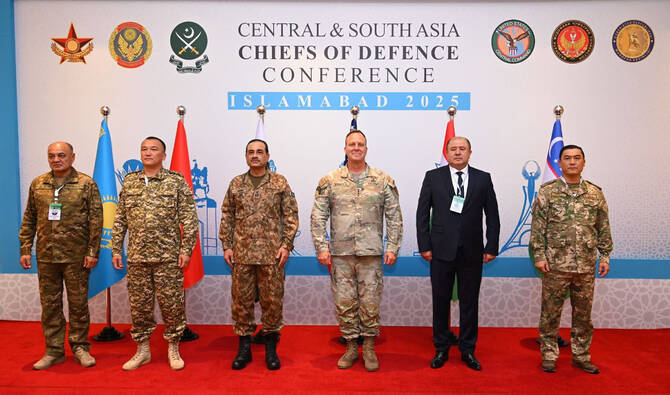In a powerful show of regional security collaboration, Pakistan hosted a rare multilateral defense conference in Islamabad on July 26, 2025. The event brought together military leaders from the United States and four Central Asian republics—Kazakhstan, Kyrgyzstan, Tajikistan, and Uzbekistan—for strategic dialogue on shared threats, including terrorism and cyber insecurity. The high-level meeting marked a notable moment in defense diplomacy, reflecting Pakistan’s renewed role in fostering regional peace.
Strengthening Defense Partnerships
Pakistan’s Chief of Army Staff, Field Marshal Syed Asim Munir, welcomed participants at the Regional Chiefs of Defense Staff Conference. In his opening remarks, he emphasized the urgent need for joint action. “In an era defined by transnational threats and complex hybrid challenges, deeper military-to-military cooperation and mutual trust are essential,” Munir stated.
He reaffirmed Pakistan’s commitment to regional stability. “Pakistan remains fully dedicated to working with partner nations to build a secure and prosperous environment,” he said. His remarks echoed the overall tone of the conference, which focused on enhancing cooperation in areas such as counterterrorism, joint training, and crisis management.
Read: Shehbaz Sharif Greenlights FBR Digital Overhaul
A Post-Afghanistan Strategic Shift
The gathering carried special significance given its timing. It was the first major multilateral defense engagement hosted by Pakistan since the withdrawal of US and NATO forces from Afghanistan in August 2021. Until that point, the United States had maintained a strong military presence in the region.
With Afghanistan’s internal instability still influencing its neighbors, Central Asian states—many of which share proximity or borders with Afghanistan—face continued risks from militancy and cross-border crime. Pakistan, with its long and porous border, remains directly exposed to these threats and has repeatedly called for stronger regional cooperation.
A Platform for Shared Goals
Held under the theme “Strengthening Bonds, Securing Peace,” the conference created space for frank discussions on military diplomacy, regional sovereignty, and emerging threats. Delegates addressed evolving security dynamics in South and Central Asia and agreed on the importance of improving crisis response systems.
Discussions also covered issues such as drug trafficking, cyber insecurity, and cross-border violence. Participants underscored that no country alone could confront these multifaceted threats. Only through collective efforts and mutual support, they agreed, could long-term peace and stability be achieved.
US Reengagement and Regional Trust
The presence of General Michael E. Kurilla, Commander of United States Central Command (USCENTCOM), underscored Washington’s renewed engagement with Islamabad and the wider region. Though relations between the US and Pakistan have seen ups and downs, recent signs suggest a slow thaw. By joining the Islamabad conference, the US signaled its interest in rebuilding military-to-military ties and contributing to regional resilience.
Delegates praised Pakistan’s leadership in initiating the dialogue and appreciated its hospitality. They also acknowledged Islamabad’s efforts to create a platform where defense chiefs could speak openly about shared concerns and explore future collaborations.
Call for Continued Coordination
One of the key outcomes of the conference was a joint reaffirmation to uphold peace, respect national sovereignty, and combat transnational challenges. The participants stressed the importance of maintaining consistent dialogue and deepening operational coordination across borders.
While no formal agreements were announced, the spirit of the gathering pointed toward ongoing engagement. The military chiefs expressed readiness to expand joint training programs, share intelligence, and establish rapid-response communication channels to deal with emerging threats.
A Rare but Timely Initiative
Regional defense conferences of this scale are uncommon in South and Central Asia, especially those involving both the US and multiple Central Asian countries. By successfully convening this one, Pakistan demonstrated diplomatic initiative and strategic foresight.
Amid shifting alliances and increasing security pressures, Islamabad’s move to gather stakeholders on one platform may serve as a model for future defense cooperation in the region. The hope now is that the momentum continues—through stronger partnerships, mutual respect, and a shared vision for peace.
Follow us on Instagram, YouTube, Facebook,, X and TikTok for latest updates
